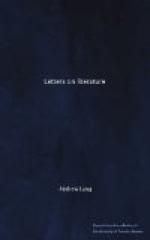Curiosity, not cheapness, assuredly, betrayed me into another purchase. If I want to read “The Pilgrim’s Progress,” of course I read it in John Bunyan’s good English. Then why must I ruin myself to acquire “Voyage d’un Chrestien vers l’Eternite. Ecrit en Anglois, par Monsieur Bunjan, F.M., en Bedtfort, et nouvellement traduit en Francois. Avec Figures. A Amsterdam, chez Jean Boekholt Libraire pres de la Bourse, 1685”? I suppose this is the oldest French version of the famed allegory. Do you know an older? Bunyan was still living and, indeed, had just published the second part of the book, about Christian’s wife and children, and the deplorable young woman whose name was Dull.
As the little volume, the Elzevir size, is bound in blue morocco, by Cuzin, I hope it is not wholly a foolish bargain; but what do I want, after all, with a French “Pilgrim’s Progress”? These are the errors a man is always making who does not collect books with system, with a conscience and an aim.
Do have a specially. Make a collection of works on few subjects, well chosen. And what subjects shall they be? That depends on taste. Probably it is well to avoid the latest fashion. For example, the illustrated French books of the eighteenth century are, at this moment, en hausse. There is a “boom” in them. Fifty years ago Brunet, the author of the great “Manuel,” sneered at them. But, in his, “Library Companion,” Dr. Dibdin, admitted their merit. The illustrations by Gravelot, Moreau, Marillier, and the rest, are certainly delicate, graceful, full of character, stamped with style. But only the proofs before letters are very much valued, and for these wild prices are given by competitive millionaires. You cannot compete with them.
It is better wholly to turn the back on these books and on any others at the height of the fashion, unless you meet them for fourpence on a stall. Even then should a gentleman take advantage of a poor bookseller’s ignorance? I don’t know. I never fell into the temptation, because I never was tempted. Bargains, real bargains, are so rare that you may hunt for a lifetime and never meet one.
The best plan for a man who has to see that his collection is worth what it cost him, is probably to confine one’s self to a single line, say, in your case, first editions of new English, French, and American books that are likely to rise in value. I would try, were I you, to collect first editions of Longfellow, Bryant, Whittier, Poe, and Hawthorne.
As to Poe, you probably will never have a chance. Outside of the British Museum, where they have the “Tamerlane” of 1827, I have only seen one early example of Poe’s poems. It is “Al Aaraaf, Tamerlane, and Minor Poems, by Edgar A. Poe. Baltimore: Hatch and Dunning, 1829, 8vo, pp. 71.” The book “came to Mr. Locker (Mr. Frederick Locker-Lampson), through Mr. R. H. Stoddard, the American poet.” So says Mr. Locker-Lampson’s Catalogue. He also has the New York edition of 1831.




